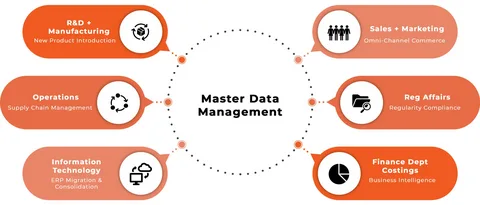Master Data Management (MDM) is the discipline of creating and maintaining a single, consistent, and accurate source of critical business data, known as master data. This includes key information about customers, products, suppliers, and employees that is shared across different departments and systems. Effective MDM ensures that everyone in an organization works from the same set of trusted data, reducing errors, improving compliance, and enhancing overall operational efficiency.
The Role of Master Data in Business Operations
Master data serves as the backbone for many business processes, from order fulfillment to customer service and financial reporting. Without a unified approach to managing this data, organizations risk inconsistencies that lead to duplicated efforts, flawed analysis, and poor customer experiences. Master Data Management provides the framework to govern and synchronize this data, ensuring it is accurate, complete, and up to date across all touchpoints.
Common Challenges Addressed by Master Data Management
Organizations often struggle with fragmented data stored in siloed systems, leading to conflicting records and a lack of visibility. Duplicate or outdated information can cause delays, increased costs, and compliance risks. Master Data Management addresses these issues by implementing data cleansing, validation, and governance processes that standardize data and establish clear ownership, significantly improving data quality and trustworthiness.
Core Components of a Master Data Management Solution
An effective MDM solution typically includes data integration tools, a central repository or hub, data quality and cleansing mechanisms, and governance policies. These components work together to collect data from multiple sources, consolidate it, remove duplicates, and enforce rules for ongoing maintenance. The goal is to create a “single source of truth” that supports consistent reporting and decision-making throughout the enterprise.
How Master Data Management Supports Regulatory Compliance
Many industries face strict regulations around data accuracy, privacy, and traceability. Master Data Management helps organizations meet these requirements by ensuring that data is accurate, auditable, and securely managed. It provides the controls necessary to enforce data policies and facilitates reporting to regulatory bodies, reducing the risk of fines and reputational damage associated with non-compliance.
The Impact of MDM on Customer Experience
Accurate master data leads to better understanding of customer needs and preferences. By consolidating customer information from various touchpoints, MDM enables personalized marketing, faster response times, and consistent service delivery. This unified view strengthens customer trust and loyalty, which directly impacts retention and revenue growth in competitive markets.
Integration of MDM with Other Enterprise Systems
Master Data Management solutions are designed to integrate seamlessly with existing enterprise systems such as ERP, CRM, and supply chain platforms. This integration ensures that master data flows consistently between systems without manual intervention, eliminating data discrepancies and improving operational efficiency. The result is a more agile and responsive organization that can adapt quickly to market changes.
Best Practices for Successful Master Data Management Implementation
Successful MDM initiatives start with strong executive sponsorship and cross-functional collaboration. Defining clear data governance roles, establishing data quality metrics, and prioritizing master data domains are critical steps. Additionally, phased implementation and continuous monitoring help manage complexity and foster user adoption, making the MDM program sustainable and impactful over time.
The Role of Data Governance in MDM
Data governance provides the policies, standards, and processes that underpin Master Data Management. It defines who is responsible for data accuracy, how data changes are controlled, and how compliance is ensured. Effective governance promotes accountability and transparency, which are essential for maintaining trust in master data and ensuring that it remains a reliable resource across the enterprise.
Technologies Enabling Modern Master Data Management
Best digital marketing agency Dubai platforms leverage advanced technologies such as AI and machine learning to enhance data matching, anomaly detection, and automated cleansing. Cloud-based MDM solutions offer scalability and easier integration with other business applications. These innovations allow organizations to handle growing data volumes and complexity while maintaining high standards of data quality and accessibility.
Measuring the ROI of Master Data Management
The benefits of Master Data Management extend beyond data accuracy to operational savings, risk reduction, and improved business agility. Organizations can measure ROI by tracking reductions in duplicate data, time saved on manual corrections, faster decision-making, and enhanced customer satisfaction. These tangible outcomes justify investment in MDM initiatives and highlight their strategic value.
The Future of Master Data Management
As businesses generate increasing amounts of data from diverse sources, Master Data Management will become even more critical. Future trends include deeper integration with big data analytics, IoT, and real-time data processing to provide dynamic, actionable insights. Organizations that invest in evolving their MDM strategies will be better positioned to innovate and maintain competitive advantages in rapidly changing markets.
Conclusion: Master Data Management as a Strategic Imperative
Master Data Management is essential for any organization looking to harness the full value of its data assets. By ensuring a single, accurate source of truth, MDM reduces operational risks, supports compliance, and enhances customer relationships. When properly implemented and governed, it becomes a foundational pillar that drives efficiency, innovation, and sustainable growth.



